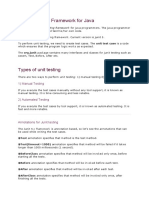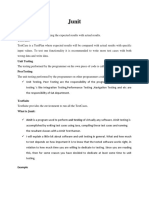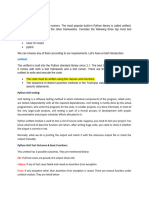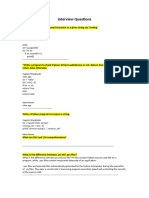Beginners Python Cheat Sheet PCC Testing PDF
Uploaded by
booklover2Beginners Python Cheat Sheet PCC Testing PDF
Uploaded by
booklover2Building a testcase with one unit test Running the test
To build a test case, make a class that inherits from When you change your code, its important to run your existing
unittest.TestCase and write methods that begin with test_. tests. This will tell you whether the changes you made affected
Save this as test_full_names.py existing behavior.
import unittest E
from full_names import get_full_name ================================================
ERROR: test_first_last (__main__.NamesTestCase)
class NamesTestCase(unittest.TestCase): Test names like Janis Joplin.
"""Tests for names.py.""" ------------------------------------------------
Traceback (most recent call last):
def test_first_last(self): File "test_full_names.py", line 10,
When you write a function or a class, you can also """Test names like Janis Joplin.""" in test_first_last
write tests for that code. Testing proves that your full_name = get_full_name('janis', 'joplin')
code works as it's supposed to in the situations it's 'joplin') TypeError: get_full_name() missing 1 required
designed to handle, and also when people use your self.assertEqual(full_name, positional argument: 'last'
programs in unexpected ways. Writing tests gives 'Janis Joplin')
you confidence that your code will work correctly as ------------------------------------------------
more people begin to use your programs. You can unittest.main() Ran 1 test in 0.001s
also add new features to your programs and know Running the test
that you haven't broken existing behavior. FAILED (errors=1)
Python reports on each unit test in the test case. The dot reports a
single passing test. Python informs us that it ran 1 test in less than Fixing the code
A unit test verifies that one specific aspect of your 0.001 seconds, and the OK lets us know that all unit tests in the When a test fails, the code needs to be modified until the test
test case passed. passes again. (Dont make the mistake of rewriting your tests to fit
code works as it's supposed to. A test case is a
your new code.) Here we can make the middle name optional.
collection of unit tests which verify your code's .
behavior in a wide variety of situations. --------------------------------------- def get_full_name(first, last, middle=''):
Ran 1 test in 0.000s """Return a full name."""
if middle:
OK full_name = "{0} {1} {2}".format(first,
Python's unittest module provides tools for testing your middle, last)
code. To try it out, well create a function that returns a full else:
name. Well use the function in a regular program, and then full_name = "{0} {1}".format(first,
build a test case for the function. Failing tests are important; they tell you that a change in the
last)
code has affected existing behavior. When a test fails, you
A function to test return full_name.title()
need to modify the code so the existing behavior still works.
Save this as full_names.py
Modifying the function Running the test
def get_full_name(first, last): Now the test should pass again, which means our original
Well modify get_full_name() so it handles middle names, but
"""Return a full name.""" functionality is still intact.
well do it in a way that breaks existing behavior.
full_name = "{0} {1}".format(first, last) .
return full_name.title() def get_full_name(first, middle, last):
---------------------------------------
"""Return a full name."""
Ran 1 test in 0.000s
Using the function full_name = "{0} {1} {2}".format(first,
Save this as names.py middle, last)
OK
return full_name.title()
from full_names import get_full_name
Using the function
janis = get_full_name('janis', 'joplin')
print(janis) from full_names import get_full_name
bob = get_full_name('bob', 'dylan') john = get_full_name('john', 'lee', 'hooker')
print(john)
Covers Python 3 and Python 2
print(bob)
david = get_full_name('david', 'lee', 'roth')
print(david)
You can add as many unit tests to a test case as you need. Testing a class is similar to testing a function, since youll When testing a class, you usually have to make an instance
To write a new test, add a new method to your test case mostly be testing your methods. of the class. The setUp() method is run before every test.
class. Any instances you make in setUp() are available in every
A class to test test you write.
Testing middle names Save as accountant.py
Weve shown that get_full_name() works for first and last Using setUp() to support multiple tests
names. Lets test that it works for middle names as well.
class Accountant():
The instance self.acc can be used in each new test.
"""Manage a bank account."""
import unittest import unittest
from full_names import get_full_name def __init__(self, balance=0): from accountant import Accountant
self.balance = balance
class NamesTestCase(unittest.TestCase): class TestAccountant(unittest.TestCase):
"""Tests for names.py.""" def deposit(self, amount): """Tests for the class Accountant."""
self.balance += amount
def test_first_last(self): def setUp(self):
"""Test names like Janis Joplin.""" def withdraw(self, amount): self.acc = Accountant()
full_name = get_full_name('janis', self.balance -= amount
'joplin') def test_initial_balance(self):
self.assertEqual(full_name, Building a testcase # Default balance should be 0.
'Janis Joplin') For the first test, well make sure we can start out with different
initial balances. Save this as test_accountant.py. self.assertEqual(self.acc.balance, 0)
def test_middle(self): import unittest # Test non-default balance.
"""Test names like David Lee Roth.""" from accountant import Accountant acc = Accountant(100)
full_name = get_full_name('david', self.assertEqual(acc.balance, 100)
'roth', 'lee') class TestAccountant(unittest.TestCase):
self.assertEqual(full_name, """Tests for the class Accountant.""" def test_deposit(self):
'David Lee Roth') # Test single deposit.
def test_initial_balance(self): self.acc.deposit(100)
unittest.main() # Default balance should be 0. self.assertEqual(self.acc.balance, 100)
acc = Accountant()
Running the tests self.assertEqual(acc.balance, 0)
The two dots represent two passing tests. # Test multiple deposits.
self.acc.deposit(100)
.. # Test non-default balance. self.acc.deposit(100)
--------------------------------------- acc = Accountant(100) self.assertEqual(self.acc.balance, 300)
Ran 2 tests in 0.000s self.assertEqual(acc.balance, 100)
def test_withdrawal(self):
OK unittest.main() # Test single withdrawal.
self.acc.deposit(1000)
Running the test
self.acc.withdraw(100)
. self.assertEqual(self.acc.balance, 900)
Python provides a number of assert methods you can use
to test your code. ---------------------------------------
Ran 1 test in 0.000s unittest.main()
Verify that a==b, or a != b
OK Running the tests
assertEqual(a, b)
assertNotEqual(a, b) ...
---------------------------------------
Verify that x is True, or x is False In general you shouldnt modify a test once its written. Ran 3 tests in 0.001s
assertTrue(x) When a test fails it usually means new code youve written
has broken existing functionality, and you need to modify OK
assertFalse(x)
the new code until all existing tests pass.
Verify an item is in a list, or not in a list If your original requirements have changed, it may be
appropriate to modify some tests. This usually happens in More cheat sheets available at
assertIn(item, list) the early stages of a project when desired behavior is still
assertNotIn(item, list) being sorted out.
You might also like
- Beginners Python Cheat Sheet PCC If While PDFNo ratings yetBeginners Python Cheat Sheet PCC If While PDF2 pages
- Beginners Python Cheat Sheet PCC Classes PDF100% (1)Beginners Python Cheat Sheet PCC Classes PDF2 pages
- Beginners Python Cheat Sheet PCC Pygal PDFNo ratings yetBeginners Python Cheat Sheet PCC Pygal PDF2 pages
- Beginners Python Cheat Sheet PCC TestingNo ratings yetBeginners Python Cheat Sheet PCC Testing2 pages
- Writing Basic Unit Tests: 44.1 Implementing The Sample ClassNo ratings yetWriting Basic Unit Tests: 44.1 Implementing The Sample Class7 pages
- 3.5.7 Lab - Create A Python Unit Test - ILMNo ratings yet3.5.7 Lab - Create A Python Unit Test - ILM9 pages
- Junit Testing Utility Tutorial: Ashley J.S MillsNo ratings yetJunit Testing Utility Tutorial: Ashley J.S Mills6 pages
- Junit - Testing Framework For Java: Types of Unit TestingNo ratings yetJunit - Testing Framework For Java: Types of Unit Testing24 pages
- Concepts of Software Engineering: TestingNo ratings yetConcepts of Software Engineering: Testing63 pages
- 方俊贤 (Ken Fang) 首席咨询顾问, 雅各布森软件(北京)有限公司 微信号: Kenfang - LispNo ratings yet方俊贤 (Ken Fang) 首席咨询顾问, 雅各布森软件(北京)有限公司 微信号: Kenfang - Lisp45 pages
- Factory & Dataprovider: Make Reports Per Object/Test: FavoriteNo ratings yetFactory & Dataprovider: Make Reports Per Object/Test: Favorite3 pages
- Introduction To Automated Unit Testing (Xunit)No ratings yetIntroduction To Automated Unit Testing (Xunit)21 pages
- Junit and Mockito Unit Testing ProcedureNo ratings yetJunit and Mockito Unit Testing Procedure4 pages
- Junit: Introduction To Testing Java Programs With JunitNo ratings yetJunit: Introduction To Testing Java Programs With Junit18 pages
- Junit Training: Chris Yeung 8 Sept, 2006No ratings yetJunit Training: Chris Yeung 8 Sept, 200635 pages
- Junit Tutorial - Testing Framework For Java: Types of Unit Testing0% (1)Junit Tutorial - Testing Framework For Java: Types of Unit Testing14 pages
- Welcome To (OLT) : Automated Online Test System Presented by Zelda Colson100% (1)Welcome To (OLT) : Automated Online Test System Presented by Zelda Colson22 pages
- Junit Testing Utility Tutorial: Ashley J.S MillsNo ratings yetJunit Testing Utility Tutorial: Ashley J.S Mills6 pages
- Lab Work Software Testing: 1.1 ObjectivesNo ratings yetLab Work Software Testing: 1.1 Objectives6 pages
- Laboratory Practice, Testing, and Reporting: Time-Honored Fundamentals for the SciencesFrom EverandLaboratory Practice, Testing, and Reporting: Time-Honored Fundamentals for the SciencesNo ratings yet
- BE EXPERT IN JAVA Part- 2: Learn Java programming and become expertFrom EverandBE EXPERT IN JAVA Part- 2: Learn Java programming and become expertNo ratings yet
- UNIX Shell Programming Interview Questions You'll Most Likely Be AskedFrom EverandUNIX Shell Programming Interview Questions You'll Most Likely Be AskedNo ratings yet
- Iomirror E3210 User'S Manual: Third Edition, May 2014No ratings yetIomirror E3210 User'S Manual: Third Edition, May 201442 pages
- Honeywell R22 To R448A Retrofit Guideline v1No ratings yetHoneywell R22 To R448A Retrofit Guideline v112 pages
- Beginners Python Cheat Sheet PCC Matplotlib PDF100% (1)Beginners Python Cheat Sheet PCC Matplotlib PDF2 pages
- Beginners Python Cheat Sheet PCC Functions PDFNo ratings yetBeginners Python Cheat Sheet PCC Functions PDF2 pages
- Beginners Python Cheat Sheet PCC Files Exceptions PDFNo ratings yetBeginners Python Cheat Sheet PCC Files Exceptions PDF2 pages
- Beginners Python Cheat Sheet PCC Pygame PDFNo ratings yetBeginners Python Cheat Sheet PCC Pygame PDF2 pages
- Valve Body W9 Type T General: ART. NO. 850001No ratings yetValve Body W9 Type T General: ART. NO. 8500012 pages















































































